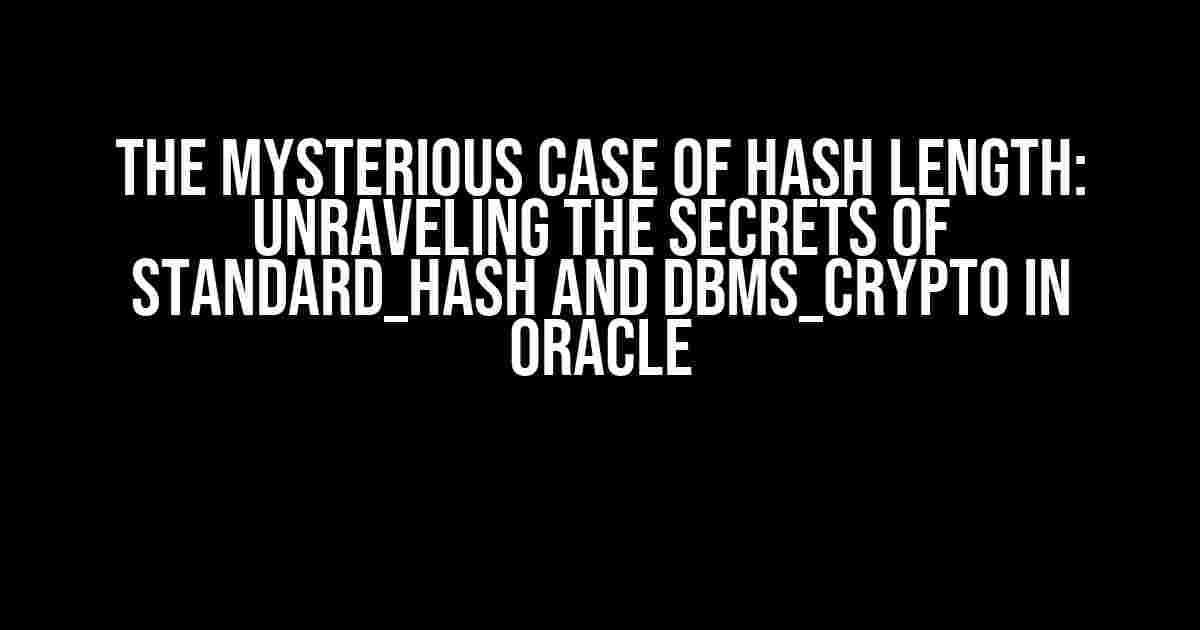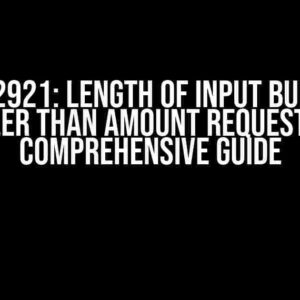Hash functions, the unsung heroes of data security! They silently toil in the background, protecting our sensitive information from prying eyes. But have you ever wondered, what’s the length of the hash generated from Standard_Hash or DBMS_Crypto in Oracle? It’s a question that has puzzled many a developer and DBA. Fear not, dear reader, for today we shall embark on a thrilling adventure to uncover the truth.
The Hash Heroes: Standard_Hash and DBMS_Crypto
In Oracle, we have two mighty hash functions: Standard_Hash and DBMS_Crypto. Both are used to generate a fixed-length string of characters from a variable-length input, but they differ in their approaches and output lengths.
Standard_Hash: The Oracle-Built Hash Function
Standard_Hash is a built-in Oracle function that generates a hash value from a string. It uses the SHA-1 (Secure Hash Algorithm 1) hashing algorithm, which produces a 160-bit (20-byte) hash value.
DECLARE
input_string VARCHAR2(100) := 'Hello, World!';
hash_value VARCHAR2(100);
BEGIN
hash_value := STANDARD_HASH(input_string, 'SHA1');
DBMS_OUTPUT.PUT_LINE('Hash Value: ' || hash_value);
END;
In this example, we’re generating a hash value from the string “Hello, World!” using Standard_Hash with the SHA1 algorithm. The output will be a 40-character hexadecimal string, representing the 20-byte hash value.
DBMS_Crypto: The Oracle Cryptography Package
DBMS_Crypto is an Oracle-supplied package that provides a range of cryptographic functions, including hash generation. It supports multiple hashing algorithms, including SHA-1, SHA-256, and SHA-512.
DECLARE
input_string VARCHAR2(100) := 'Hello, World!';
hash_value VARCHAR2(100);
hash_algorithm VARCHAR2(100) := 'SHA-256';
BEGIN
hash_value := DBMS_CRYPTO.HASH(input_string, hash_algorithm);
DBMS_OUTPUT.PUT_LINE('Hash Value: ' || hash_value);
END;
In this example, we’re generating a hash value from the string “Hello, World!” using DBMS_Crypto with the SHA-256 algorithm. The output will be a 64-character hexadecimal string, representing the 32-byte hash value.
The Length Conundrum: Unraveling the Mystery
Now that we’ve introduced our hash heroes, it’s time to tackle the question of hash length. The length of the hash generated from Standard_Hash or DBMS_Crypto depends on the hashing algorithm used.
| Hashing Algorithm | Hash Length (Bytes) | Hash Length (Characters) |
|---|---|---|
| SHA-1 | 20 | 40 |
| SHA-256 | 32 | 64 |
| SHA-512 | 64 | 128 |
The table above illustrates the hash lengths for different algorithms. Notice how the hash length increases with the algorithm’s strength.
Standard_Hash: SHA-1 and Its 20-Byte Hash Value
As mentioned earlier, Standard_Hash uses the SHA-1 algorithm, which produces a 20-byte (160-bit) hash value. When represented as a hexadecimal string, this translates to a 40-character output.
DECLARE
input_string VARCHAR2(100) := 'Hello, World!';
hash_value VARCHAR2(100);
BEGIN
hash_value := STANDARD_HASH(input_string, 'SHA1');
DBMS_OUTPUT.PUT_LINE('Hash Value: ' || hash_value);
DBMS_OUTPUT.PUT_LINE('Hash Length (Bytes): ' || LENGTH(UTL_RAW.CAST_TO_RAW(hash_value)) / 2);
DBMS_OUTPUT.PUT_LINE('Hash Length (Characters): ' || LENGTH(hash_value));
END;
In this example, we’re generating a hash value from the string “Hello, World!” using Standard_Hash with the SHA1 algorithm. The output will be a 40-character hexadecimal string, representing the 20-byte hash value. We’re also calculating the hash length in bytes and characters using UTL_RAW.CAST_TO_RAW and LENGTH functions.
DBMS_Crypto: Hash Length Depends on the Algorithm
DBMS_Crypto, on the other hand, supports multiple hashing algorithms, each with its own hash length. The hash length depends on the algorithm used, as shown in the table above.
DECLARE
input_string VARCHAR2(100) := 'Hello, World!';
hash_value VARCHAR2(100);
hash_algorithm VARCHAR2(100) := 'SHA-256';
BEGIN
hash_value := DBMS_CRYPTO.HASH(input_string, hash_algorithm);
DBMS_OUTPUT.PUT_LINE('Hash Value: ' || hash_value);
DBMS_OUTPUT.PUT_LINE('Hash Length (Bytes): ' || LENGTH(UTL_RAW.CAST_TO_RAW(hash_value)) / 2);
DBMS_OUTPUT.PUT_LINE('Hash Length (Characters): ' || LENGTH(hash_value));
END;
In this example, we’re generating a hash value from the string “Hello, World!” using DBMS_Crypto with the SHA-256 algorithm. The output will be a 64-character hexadecimal string, representing the 32-byte hash value. We’re also calculating the hash length in bytes and characters using UTL_RAW.CAST_TO_RAW and LENGTH functions.
Conclusion: The Length of the Hash Revealed
And there you have it, folks! The mystery of the hash length has been solved. Standard_Hash uses the SHA-1 algorithm, producing a 20-byte hash value, while DBMS_Crypto supports multiple algorithms, each with its own hash length. Remember, when working with hash functions, it’s essential to understand the underlying algorithm and its output length to ensure data integrity and security.
So, the next time someone asks you about the length of the hash generated from Standard_Hash or DBMS_Crypto in Oracle, you can confidently reply, “It depends on the algorithm, my friend!”
Final Thoughts and Best Practices
When working with hash functions in Oracle, keep the following best practices in mind:
- Choose the appropriate hashing algorithm based on your security requirements.
- Understand the output length of the hash function and plan accordingly.
- Use a secure method to store and compare hash values, such as using a salt and hashing with a pepper.
- Regularly review and update your hashing algorithms to ensure they remain secure.
By following these guidelines, you’ll be well-equipped to handle the complexities of hash functions in Oracle and keep your data safe from prying eyes.
Frequently Asked Questions
Got questions about the length of hash generated from standard_hash or dbms_crypto in Oracle? We’ve got answers!
What is the default length of a hash generated using STANDARD_HASH in Oracle?
The default length of a hash generated using STANDARD_HASH in Oracle is 32 characters, which is a SHA-256 hash. However, you can specify a different algorithm and length using the optional `hash` and `hash_format` parameters.
Can I generate a shorter hash using STANDARD_HASH in Oracle?
Yes, you can generate a shorter hash using STANDARD_HASH in Oracle by specifying a different algorithm, such as MD5 or SHA-1, which produce shorter hashes. For example, an MD5 hash is 16 characters long, while a SHA-1 hash is 28 characters long.
What is the maximum length of a hash generated using DBMS_CRYPTO in Oracle?
The maximum length of a hash generated using DBMS_CRYPTO in Oracle depends on the algorithm used. For example, a SHA-512 hash can be up to 64 characters long, while a SHA-3 hash can be up to 256 characters long.
Are the hashes generated by STANDARD_HASH and DBMS_CRYPTO in Oracle case-sensitive?
Yes, the hashes generated by both STANDARD_HASH and DBMS_CRYPTO in Oracle are case-sensitive. This means that even a single character difference in the input data can result in a completely different hash value.
Can I use the hashes generated by STANDARD_HASH and DBMS_CRYPTO in Oracle for authentication purposes?
Yes, the hashes generated by both STANDARD_HASH and DBMS_CRYPTO in Oracle can be used for authentication purposes, such as storing password hashes or validating digital signatures. However, it’s essential to use a salt value and iterate the hashing process multiple times to make the hash more secure.


